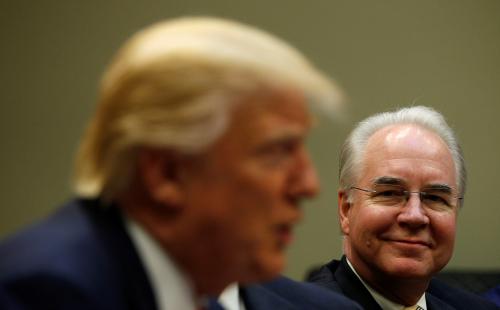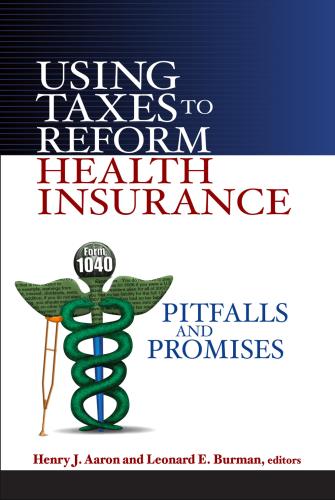This article originally appeared in the New York Daily News on June 26, 2017.
Each day brings another depressing reminder that hyper-partisanship has undermined effective government and is eroding the bonds that make Americans a nation. One recalls a time when Republicans and Democrats, despite differences, could compromise, each accepting half a loaf, so that the nation could have a whole one.
Today, it seems that vicious partisanship could not get worse. Then, one reads a proposal such as the recently released Senate health bill, the Better Care Reconciliation Act of 2017, and realizes that it just did.
Fashioned in secret by Republican leaders through a process that excluded any Democratic voice, headed for a vote without any hearings, the Senate’s bill is the fruit of a process that contrasts embarrassingly with the protracted open debate and extensive hearings that preceded enactment of the Affordable Care Act (ACA) or, as it is called, Obamacare.
In the seven years since its enactment, the ACA has done enormous good. Obamacare has brought insurance to roughly 20 million previously uninsured Americans, both by expanding Medicaid coverage and by creating marketplaces where individuals and small businesses can buy health insurance with greater ease and better information than they ever enjoyed before. It has contributed to a sustained slowdown in growth in per-person health care costs.
Yet, everyone — supporters and critics alike — recognizes that Obamacare is not working perfectly. A major reason is active sabotage by the Republican Congress and administration eager for evidence that Obamacare is failing. They create turmoil by raising doubts that the administration will make statutorily required payments to insurers to reimburse them for the cost of benefits the insurers are legally required to provide.
Trump has also declared that his administration would not enforce the requirement that people carry insurance, a provision on which insurers depend to make sure that the healthy as well as the sick buy coverage.
The needless uncertainties these actions create have caused insurers to abandon some Obamacare marketplaces. Unless resolved, this uncertainty will cause others insurers to raise premiums next year. But for this campaign of sabotage, Obamacare would be on a path to stability.
Nonetheless, genuine opportunities exist to bring better insurance to more people at less cost. Alas, the Senate bill does just the reverse.
It would deliver worse insurance, cover fewer people, and raise costs for coverage of a given quality. It would end the ACA’s expansion of Medicaid. Additional cuts in federal support for Medicaid would eventually force states to narrow the number of people Medicaid serves, the benefits it provides, or both. The Senate bill’s proposed Medicaid cuts far exceed those of the House-passed American Health Care Act that President Trump labeled as “mean.”
For people who buy health insurance through Obamacare exchanges, the Senate bill is equally feral. Under Obamacare financial assistance is based on an insurance plan that covers all but 30% of the expected cost of defined health services. Most people who buy such plans are also eligible for subsidies to help them afford the deductibles and other payments that such plans impose.
Under the Senate bill, financial assistance would be based on a plan that could expose buyers to 42% of the cost and a possibly narrowed set of services, and would end extra payments to assist most enrollees with cost sharing expenses. Should the Senate bill become law, millions of people will discover that while being technically “insured,” high deductibles and copayments make health care unaffordable.
The Senate bill would foster the very market instability that is now troubling Obamacare critics and supporters alike.
Furthermore, the Senate bill would foster the very market instability that is now troubling Obamacare critics and supporters alike. It would terminate the requirement that people carry health insurance, but not the requirement that insurers sell people coverage whenever they want it, thus creating a financial incentive for people to wait until they get sick to buy coverage. The inevitable result would be a smaller market with higher premiums.
All of these changes would save a lot of money, which both the Senate and House bills would devote to tax cuts. As the Senate’s proposed tax cuts are the same as those in the previously passed House bill, we know the cost — more than $600 billion over ten years. And we know who would receive most of those tax cuts: individuals earning more than $200,000 a year and couples earning more than $250,000 a year. The richest 0.1% of tax filers would enjoy tax cuts averaging $200,000 a year.
Trump was right that the House-passed AHCA was mean. What adjectives should one apply to the Senate’s proposed alternative?
The Brookings Institution is committed to quality, independence, and impact.
We are supported by a diverse array of funders. In line with our values and policies, each Brookings publication represents the sole views of its author(s).








Commentary
Op-edJust how bad is the Senate’s health care reform bill
June 26, 2017